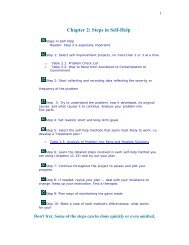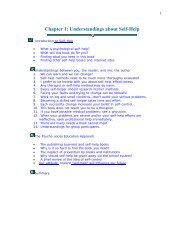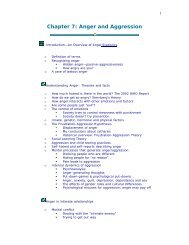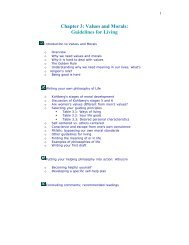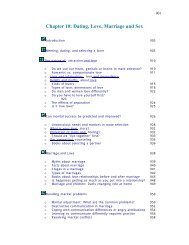Methods for Changing Behaviors - Psychological Self-Help
Methods for Changing Behaviors - Psychological Self-Help
Methods for Changing Behaviors - Psychological Self-Help
Create successful ePaper yourself
Turn your PDF publications into a flip-book with our unique Google optimized e-Paper software.
about taking a walk," "it would be nice if you picked up your dirty<br />
clothes," etc. The partner can at any time grab one of your wish notes<br />
and make it come true.<br />
STEP FOUR: Schedule the desired activity and reward, carry out<br />
contract, adjust your contract as needed.<br />
Such a contract may need to be tailored to your needs <strong>for</strong> the next<br />
2 or 3 months. If possible, anticipate and schedule a specific time <strong>for</strong><br />
the desired behavior and reward. The first few hours or days of a selfhelp<br />
project are especially important; do everything possible to get the<br />
new behavior to occur and be rewarded. Getting started is crucial.<br />
If you just can't do it, revise your goals. Take smaller steps. Give<br />
bigger rewards. Try again. It may take 15 to 20 small steps to get<br />
from where you are to where you want to be. In this way you "shape"<br />
your behavior gradually over a period of weeks. As the behavior<br />
modifiers say, "If it's hard, you are doing it wrong. Think small!"<br />
Examples: gradually increase time spent exercising, studying, being a<br />
good listener, etc. Gradually decrease smoking, calories, TV, critical<br />
comments, etc. More specifically, the American Cancer Society<br />
recommends the reduction of cigarettes by 25% each day with a<br />
specific time set to quit within a week. That may be much too fast a<br />
pace; smokers may need weeks to quit. Just keep "tinkering" with the<br />
contract until it works. Don't give the unwanted behavior any hope<br />
that you will eventually give up.<br />
Besides "reward behavior as soon as possible" and "shift from full<br />
rein<strong>for</strong>cement to partial rein<strong>for</strong>cement," chapter 4 gives some other<br />
rules <strong>for</strong> using rein<strong>for</strong>cers: (1) don't over-reward or give rewards <strong>for</strong><br />
very easy tasks, (2) don't give extrinsic rewards <strong>for</strong> enjoyable tasks<br />
and only give rewards a short while <strong>for</strong> potentially interesting<br />
activities, such as studying, (3) don't let your rewards inadvertently<br />
rein<strong>for</strong>ce some unwanted behavior (e.g. don't take a break while mad<br />
or when daydreaming), (4) avoid using rewards as bribes or<br />
enticements, if possible; "surprise" or unexpected rewards work<br />
better, and (5) don't neglect either the short-term or the long-term<br />
rein<strong>for</strong>cers of your unwanted behavior. Use both immediate and longterm<br />
payoffs to make the wanted behavior stronger and more<br />
frequent. Chapter 4 will help you generally understand behavior.<br />
STEP FIVE: Fade out the rewards; develop naturally satisfying<br />
responses.<br />
You shouldn't have to keep rewarding every new desired behavior<br />
<strong>for</strong>ever. In fact, the behavior, once it is occurring consistently, can be<br />
further strengthened by reducing the rewards. See discussion of partial<br />
rein<strong>for</strong>cement in chapter 4. Reduce the extrinsic rein<strong>for</strong>cement, but<br />
increase the intrinsic satisfaction (see method #15), and try to<br />
arrange naturally occurring rewards. For instance, if your new<br />
behavior, say smoking or eating less, is saving you money, make the<br />
saved money very visible and available <strong>for</strong> special uses. Or, if you are<br />
1132



